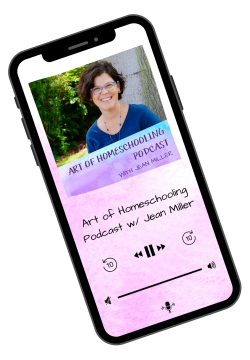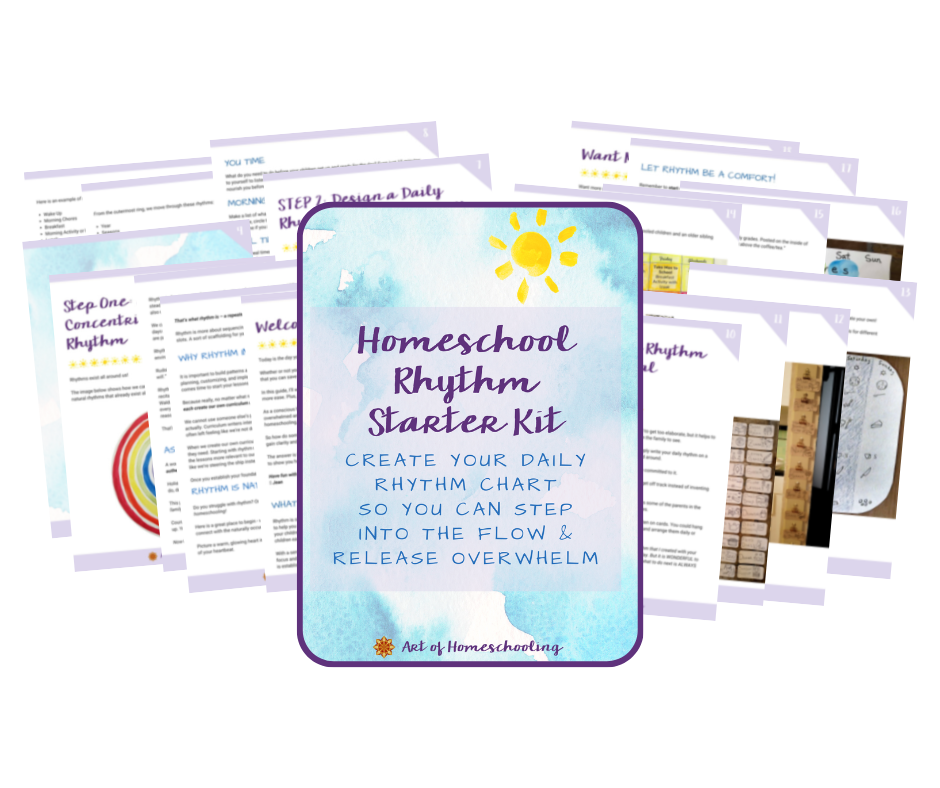Episode 53
As homeschooling parents, how do we handle the day-to-day challenges of homeschooling life without allowing them to bring us down? Equanimity is our goal, my friends. That ability to keep our composure even in the midst of a difficult situation and find serenity. Here’s how to embrace equanimity as a homeschooling parent.
Welcome to Episode 53 of the Art of Homeschooling Podcast!
By equanimity, we’re talking about how to observe our feelings without letting them sweep you away! And stay calm under pressure.
It’s not an easy task, but is so worthwhile.
Holding the Space for All the Feelings
When I was in the midst of it all homeschooling three kids, I sometimes felt like the negativity was really going to bring me down! The whining, complaining, resistance, and bickering.
But when I learned to gain a little distance from all the big feelings by just accepting them – rather than feeling like the day was falling apart and it was my job to fix it – I was able to relax a bit more and more each day.
This was a gradual process, and I do mean GRADUAL. But it made all the difference in how I felt and how I showed up in my homeschool.
As homeschooling parents, we create and hold space for ALL the emotions in our home. Everyone’s! That can feel like a lot some days.
So how do we keep from reacting but also keep going?
A Verse for Our Time
I have a beautiful poem to share along with a few ways you can practice equanimity yourself.
A Verse for Our Time by Rudolf Steiner
We must eradicate from the soul
All fear and terror of what comes towards man out of the future.
We must acquire serenity
In all feelings and sensations about the future.
We must look forward with absolute equanimity
To everything that may come.
And we must think only that whatever comes
Is given to us by a world-directive full of wisdom.
It is part of what we must learn in this age,
namely, to live out of pure trust,
Without any security in existence.
Trust in the ever present help
Of the spiritual world.
Truly, nothing else will do
If our courage is not to fail us.
And let us seek the awakening from within ourselves
Every morning and every evening.
Rudolf Steiner is the founder of Waldorf education. And over 100 years ago, he helped to start the first Waldorf School in Germany. Steiner’s motivation? To bring about social and economic renewal after the devastation of WWI.
I find it fascinating to think about this…
Waldorf education was created for healing.
And this verse seems especially relevant today. When we’re overwhelmed and exhausted holding space within our homes and the world outside our homes is discordant and divisive.
Do you ever feel derailed or scared about the world that we will turn over to our children?
When the world around us seems uncertain and even scary, what can we as mothers do to nurture ourselves and our children?
With acceptance and “absolute equanimity,” we can keep fear at bay and stay hopeful, in our homes and in our world.
Observing and Accepting Our Feelings
Rudolf Steiner also designed a series of exercises to encourage us to think with our hearts rather than our heads. He taught these to many, including the teachers in that first Waldorf school.
The third of those six exercises is a practice to observe our feelings throughout the day so we can restrain strong feelings, and strengthen feeble ones, in order to find balance.
You’ll find a link below for resources for further exploring Steiner’s Six Exercises.
The idea is that when we can notice and name our feelings, we can accept them for what they are and keep them in proportion, rather than letting them take over or sweep us away.
Sometimes this takes a little effort, I know. To keep from just reacting to a situation like we always have. To keep from yelling, or taking sides, or trying to fix the situation.
And I know the challenges of looking to the future of our world, as Steiner says “with absolute equanimity to everything that may come.” Just like you, I sometimes want to rail against all the pain and suffering, against the inequalities in our world.
But what I’ve found is that by doing the work to accept any and all emotions that come my way, I feel so much more free. And so much more present to myself, my children, my partner, and my life. This work is worth it. Believe me.
Practicing Equanimity
Here are a few strategies you might consider the next time you’re having one of those days and your emotions feel intense and all over the place.
Try this phrase from author Kim John Payne, “I can see this is hard for us.”
A pause in the heat of the moment to regroup, welcome compassion back in, and to breathe, can really help to calm the heat down a few notches.
More details below about the work of Kim John Payne and his newest book, Being at Your Best When Your Kids are at Their Worst.
Recognize that your feelings are generated by your thoughts and you can “try on” a different thought.
So for example, when I think about my boys’ upsetting behavior, I may have responded by thinking something like “Why are my boys fighting ALL the time! What is wrong with them!“
Perhaps I might have been able to really examine that thought and try on this one instead: “Yup, brothers fight sometimes and that’s ok.”
Once I am coming from a more accepting place, I’m so much more likely to step in with ideas for how they can take a break instead of contributing to the escalation of anger and yelling.
Instead of getting swept away, try on the idea of equanimity, observe and accept all the feeling, and find your calm center.
Equanimity is our Goal
Parenting is hard work. It calls on us to dig deep.
And when the outside world seems like a crazy and scary place, parenting can feel even more challenging.
I hope I’ve encouraged you to try shifting the energy a bit by practicing equanimity. Equanimity is our goal, my friends!
It takes just a little bit of practice every day and you can strengthen your ability to keep your composure even in the midst of any challenges life brings your way.?
Go Deeper
If you’re seeking a deeper discussion of Kim John Payne’s new book, Being at Your Best Even When You’re Kids are at Their Worst, I’m leading a masterclass focusing on the practices introduced in this book. We’re exploring how to bring more compassion to ourselves and our children inside the Inspired at Home community. You’re welcome to join us!
Here’s a wonderful PDF resource to explore more deeply Rudolf Steiner’s Six Basic Exercises to develop thinking, feeling, and willing. These exercises for contemplation or meditation are designed to bring balance to your thoughts, feelings and actions.
Rate & Review the Podcast
If the Art of Homeschooling Podcast has inspired you, I’d LOVE it if you could rate and review the podcast on your favorite podcast player! Reviews can be left on Apple Podcasts (iTunes), Podcast Addict, or Stitcher.
Or simply pop on over to lovethepodcast.com/artofhomeschooling and choose where you want to leave your review.
And if you want to show your appreciation for the Art of Homeschooling Podcast, you can buy me a coffee!
Never Miss an Episode!
 Listen & Follow:
Listen & Follow:
Check Out All the Episode Here (<<<Click that link!)
Save or share this encouragement on Pinterest with the image below.



